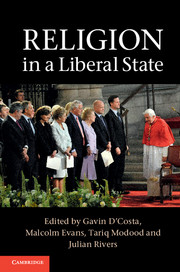Book contents
- Frontmatter
- Contents
- List of contributors
- Acknowledgements
- Introduction
- 1 Religion in a liberal state
- 2 The European Court of Human Rights and religious neutrality
- 3 Religion and sexual orientation: conflict or cohesion?
- 4 Liberal religion and illiberal secularism
- 5 Moderate secularism in liberal societies?
- 6 Excluded, included or foundational?
- 7 Justificatory secularism
- 8 What lacks is feeling: mediating reason and religion today
- 9 Arguing out of bounds: Christian eloquence and the end of Johannine liberalism
- Index
- References
1 - Religion in a liberal state
Published online by Cambridge University Press: 05 June 2014
- Frontmatter
- Contents
- List of contributors
- Acknowledgements
- Introduction
- 1 Religion in a liberal state
- 2 The European Court of Human Rights and religious neutrality
- 3 Religion and sexual orientation: conflict or cohesion?
- 4 Liberal religion and illiberal secularism
- 5 Moderate secularism in liberal societies?
- 6 Excluded, included or foundational?
- 7 Justificatory secularism
- 8 What lacks is feeling: mediating reason and religion today
- 9 Arguing out of bounds: Christian eloquence and the end of Johannine liberalism
- Index
- References
Summary
The role of religion in liberal societies raises deep questions about the moral basis and legitimacy of liberalism. This is because the legal and regulatory requirements of a liberal political order in many respects challenge religious practices and the ways in which religious beliefs are manifested. In the view of many religious people, it challenges their beliefs as well because of the internal connection between their beliefs and the way they seek to manifest and practise those beliefs. What is it that gives liberalism such authority and why are its beliefs and values so privileged?
The challenge, however, is not just to the basis of the authority of the liberal state, but also to religion within it and in particular whether a religion seeking a role in a liberal society can do so only if it is a liberalized form of that religion. If this is so, then it may be that being part of a liberal political order will have radical effects on the integrity of the beliefs held by those who espouse them by requiring that such beliefs should be held in a liberal way as a precondition of playing a part in the liberal order.
These are not just abstract, academic questions in normative jurisprudence and political philosophy but are also of current political importance and controversy. They have developed as an important part of the public agenda in Western societies at the moment. I give just a few examples of this:
the debate in France about whether to ban the veil worn by Muslim women in public places – a law which has now been passed;
debates in the UK arising out of the Equality Act 2010 about the rights of religious organizations to discriminate in recruitment in favour of those with sympathy for and in some cases belief in the doctrines and practices taught by that religion;
[…]
- Type
- Chapter
- Information
- Religion in a Liberal State , pp. 9 - 37Publisher: Cambridge University PressPrint publication year: 2013
References
- 3
- Cited by



